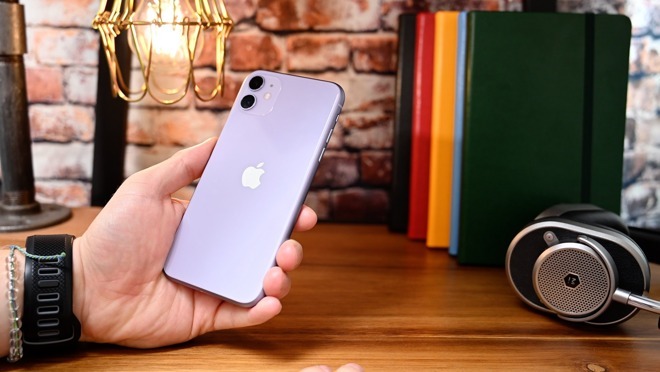iPhone 11 selfie camera fails to crack DxOMark's top-ten list
Digital camera specialist DxOMark on Thursday released a comprehensive review of the front-facing selfie camera on Apple's iPhone 11, finding the device to offer good, if not great, performance compared to competing smartphones.

Calling it the "junior partner" to iPhone 11 Pro and 11 Pro Max, DxOMark in its review notes iPhone 11 shares selfie camera specifications with its more expensive siblings. On paper, both iPhone lines should yield identical results, as both boast a 12 megapixel sensor, 23mm-equivalent focal length lens and support for advanced photo processing features like Portrait Mode and Smart HDR.
According to DxOMark, the iPhone 11's fixed-focus lens is its Achilles heel.
While exposure, white balance and color reproduction are generally good, save for expectedly mediocre performance in low-light situations, DxOMark found focus to be a consistently weak point for the handset. Interestingly, iPhone 11 was outperformed by iPhone 11 Pro Max in various focus tests, including still photography and video, with subjects becoming noticeably out of focus the farther they move away from the camera.
The group did not offer an explanation for the apparent disparity between iPhone 11 and 11 Pro Max, though it did note Samsung's Galaxy S10+ outperformed both iPhones thanks to an autofocus system. Samsung's model also trumped iPhone 11 in simulated bokeh shots, marketed by Apple as Portrait Mode photography.
DxOMark found iPhone 11 to deliver "nice" color, accurate exposure and high detail, especially when photographing brightly-lit outdoor scenes. The sensor was somewhat noisy in all conditions, however, and suffered loss of detail in certain situations.
Overall, iPhone 11's selfie camera achieved a score of 91 points, putting it in 13th place behind top-performer Huawei, a slew of Samsung smartphones, Asus' ZenFone 6, iPhone 11 Pro Max and Google Pixel 3 and Pixel 4.
DxOMark published an in-depth evaluation of iPhone 11's rear-facing cameras in January.

Calling it the "junior partner" to iPhone 11 Pro and 11 Pro Max, DxOMark in its review notes iPhone 11 shares selfie camera specifications with its more expensive siblings. On paper, both iPhone lines should yield identical results, as both boast a 12 megapixel sensor, 23mm-equivalent focal length lens and support for advanced photo processing features like Portrait Mode and Smart HDR.
According to DxOMark, the iPhone 11's fixed-focus lens is its Achilles heel.
While exposure, white balance and color reproduction are generally good, save for expectedly mediocre performance in low-light situations, DxOMark found focus to be a consistently weak point for the handset. Interestingly, iPhone 11 was outperformed by iPhone 11 Pro Max in various focus tests, including still photography and video, with subjects becoming noticeably out of focus the farther they move away from the camera.
The group did not offer an explanation for the apparent disparity between iPhone 11 and 11 Pro Max, though it did note Samsung's Galaxy S10+ outperformed both iPhones thanks to an autofocus system. Samsung's model also trumped iPhone 11 in simulated bokeh shots, marketed by Apple as Portrait Mode photography.
DxOMark found iPhone 11 to deliver "nice" color, accurate exposure and high detail, especially when photographing brightly-lit outdoor scenes. The sensor was somewhat noisy in all conditions, however, and suffered loss of detail in certain situations.
Overall, iPhone 11's selfie camera achieved a score of 91 points, putting it in 13th place behind top-performer Huawei, a slew of Samsung smartphones, Asus' ZenFone 6, iPhone 11 Pro Max and Google Pixel 3 and Pixel 4.
DxOMark published an in-depth evaluation of iPhone 11's rear-facing cameras in January.

Comments
So, for FaceTime, if an iPhone 8 can show everyone’s... uh... home face, then I sure don’t need a better front camera. I need a makeup filter for incoming video.
I don't doubt that some other company out there has put more emphasis than Apple on the front-facing camera, and might be genuinely better for selfies -- but as we've seen with innumerable cameras that offer more megapixels or more zoom or more something-else, that doesn't make it the "best" camera overall (and sometimes not even in the area of the feature they promote as the leading thing about their camera).
The camera on the other side of the phone is the one that matters and if it’s not class leading, it’s close.
That said though, the front facing cameras should advance and show improvements. In the flagship space that is even more of an issue. Especially as camera versatility is now where phone cameras get their plus points.
Apple finds itself in this situation through its own strategic planning. It has been late to adopt certain features and there isn't much more to it than that. It has improved a fair bit with the iPhone 11 series but still lags in the versatility stakes.
In fact, they even delayed reviewing the iPhone 11 Pro Max precisely to make sure Deep Fusion was live before they evaluated it.
Nevertheless, it still came in behind the Android leaders in the camera evaluations.
The spec sheet is key in certain areas like noise where Apple is continually rated behind competitors or areas like the ultrawide camera which has no 'night mode' capability at all.
On the other hand, Apple put more focus on the specsheet side of things when it came to video. The problem is that most people value photo quality over video quality as they take far more photos than videos.
Having a decent image that breaks down periodically in a call is good for no one. Stable connection and decent audio take centre stage for most people.
Thankfully, 5G brings QoS, intelligent bandwidth optimisation and lower latency to the table.